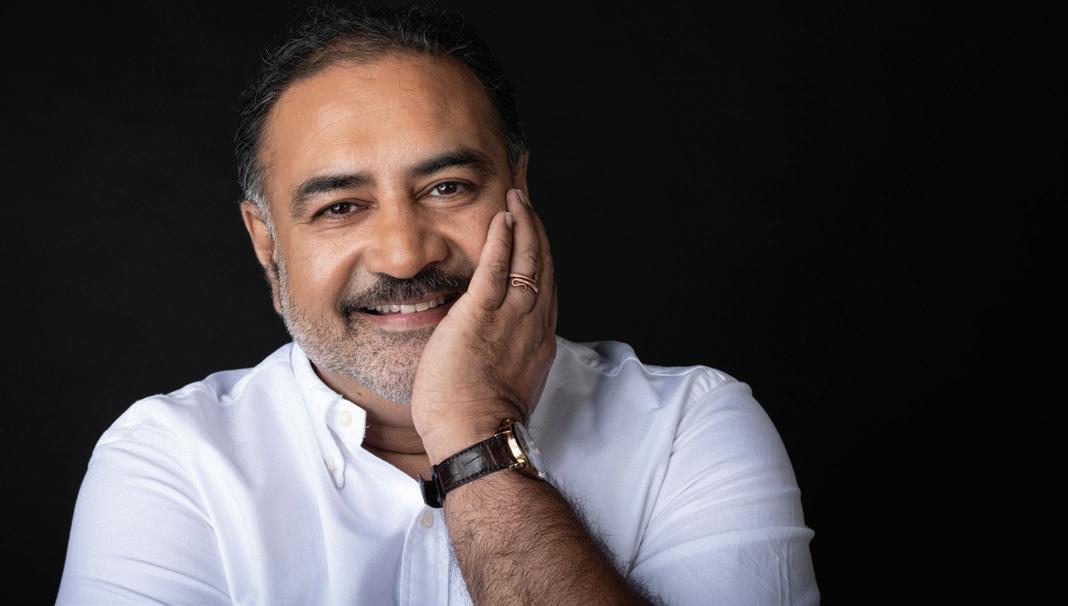
22 minute read
European Business caught with the Chairman and Group CEO of Petra Group Datuk (Dr) Vinod Sekhar
as well as the Chairman of Vinod Sekhar Trust and Founder of the Vinod Sekhar Foundation. Renowned for his entrepreneurial prowess, he has steered the company to global prominence. Beyond business, Sekhar is a passionate philanthropist, dedicated to numerous social causes.
As the Chairman and Group CEO of Petra Group, you have achieved significant success in various industries. Could you please provide our readers with an overview of the key sectors that Petra Group operates in and the core values that drive the company’s growth?
Advertisement
I started the business when I was 19 or 20 and we created the STI Group first, which evolved into The Petra Group. I’ve been doing this for over 30 years, in that process, we’ve gone into a wide array of business, but always focused on what I thought would be innovative and something that would bring value to society in some form. For example, in my career we created the first commercial internet company in
South East Asia. We developed the smallest optic engine that allowed projection technology to be reduced to a small size and we created circular abrasive discs. We did all this, close to, 30 years ago.
In relation to farming, we created the largest fruit and vegetable farm in East Asia — 9,000 hectares, at the time, which was to ensure food security and move ahead of anyone discussing food security at that time.
Currently, we are in modular housing, using our own technology, our own IP, in a sustainable way of building homes quicker and [making them more] affordable. We are doing everything from low cost homes to workers accommodation, to middle-income homes. We are doing the
UK, Australia, Malaysia, India, and The Middle East, and we will enter America as well.
We also have Green Rubber, which started quite effectively when we were supplying Timberland and other companies. However, that was a very manual labour intensive process. We have evolved the technology over a number of years and now, this year, the newest process — which is an automated, state of the art delivery system and processing system — now allows what was a maximum of 4,000 tons a year in a factory site, we can now do 24,000 tons a year. [This] allows us to produce effectively for the larger companies, for the larger tire companies, the car companies, and the other companies that require rubber compound.
At the same time, we are now truly dealing with the world’s number one environmental hazard, which is tires. Over 1.5 billion tires are thrown away every year — [its] impact in waste is everything from diseases, like Dengue, to Zika, to pollution when it catches fire, and contamination of the water table when it is buried. I’m proud of that. It was my father’s and his partner’s original technology that was not quite commercial enough, and I am proud that I played a role in developing it into what it became today, which is the fourth generation, and the creation of Green Rubber itself, using their formula of the T-link system.
We are also in vanilla — plantation and processing vanilla — which is the second most valuable spice. But what is more exciting, the vanilla ecosystem allows for true social capitalism at play, which means we allow for poverty eradication. The stakeholders and the farmers are given an opportunity to grow this, and we buy it at a fixed price, and we give them an upside. It actually lifts entire communities up; entire families suddenly enter middle-income level, and it is something they can pass on to their children. It is an exciting programme, we are expanding it to Sabah, in East Malaysia and I am excited about where it can go.
We are also in the process of creating a downstream business and our own brand for global rollout. So exciting times for that company, as well. We are of course in media, our film business. I try to look at making films that matter, that make a difference, that either feel good or sends a message that is important for the world. I think there is enough bad news in the world, we do not have to add to it and would rather not be part of adding to it. I would like to find ways of uplifting people or giving a message that is required. We have had quite a bit of success: we did Liar’s Dice out of
India, which was the India nominee for Best Foreign Picture at the Oscar’s several years ago. Recently, we did The Sunny Side of the Street out of Hong Kong, directed by Lau, and that has won five Golden Horse awards in Taiwan, and it has won Hong Kong film festival awards. We are very excited about how it is going to do around the world.
We also have Lori which is a short film and won a Cannes selection for short film. [We have] several others that we are developing now, and I am excited about where our film business is going and developing. We have gone to America now and we will keep doing what we do. We are also going to the technology, the platform side and developing that. And I think that has a very sound future. It is a chance, but like all innovations, if you do not take a chance, nothing happens. We have several other companies, we have our news business; it is the fastest growing news site in Malaysia, called The Vibes. It runs in two languages: English and Malay and we are expanding it aggressively, and I hope to make it regional soon. We have several others growing businesses on the digital side, as well as on the sustainable furniture side.
This, along with our foundation and our institute on social capitalism is our core value, that is: to make profit, but to lift communities with us. There is absolutely nothing wrong with making money; it has to make money, otherwise nothing really, has global impact. As you make money, you can always ensure that the people who help you make money, and the community that you sell to, can grow with you. That is the plan, and you cannot always get it right, but the attempt has to be made; and then you keep tweaking it, and fixing it, until you get it right. And that is what we try to do.
Sustainability is a core focus for Petra Group. How has the company integrated sustainable practices into its business strategies, and what are some notable initiatives that demonstrate Petra Group’s commitment to environmental and social responsibility?
Our core value is social capitalism, and is something I have always believed in. I do not believe in socialism, or communism; I believe that true capitalism is the way forward, but people have misunderstood what true capitalism is: true capitalism is sustainable wealth creation. You can only make money if society, the community, has the money to spend.
As a businessman, how do I make money: I sell someone a product or a service. How do I make more money: I need more people that can buy my products and services. So, to do that, I need more people that are able to afford it. I have to play a role in lifting people out of poverty, into the middle class, so that my market grows. And hopefully they will do the same — that is sustainable wealth creation, and that is the only way things can and should work. It is not about making money or not making money, it is about ensuring there is a certain fairness in how the world operates. The fact that we live in a world today where we have simultaneous epidemics, of both starvation and obesity, at the same time and in the same countries sometimes, is ridiculous. And it is just because we have accepted it and that is not good enough. The world is rich enough, we have enough resources to absolutely make a difference.
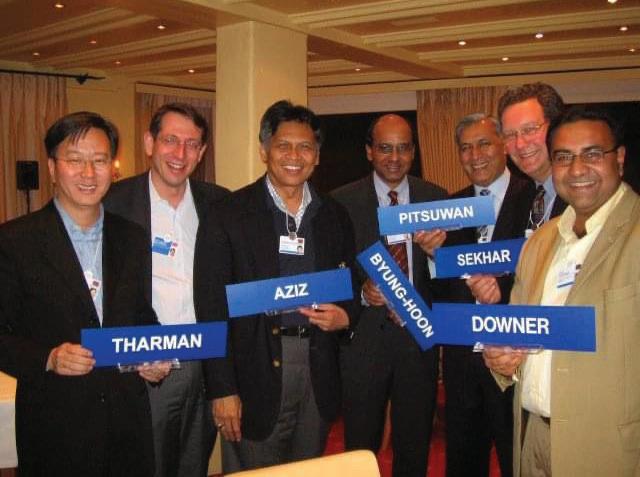
It is not just about taxation, it is about changing the way businesses operate, to make businesses economically understand they have a role to play, it is not just politicians and governments that have to deal with societal development. We have to deal with societal development; we have to be part of the solution.
Business leaders are quite brilliant, every day we fix companies, we turn companies around, we solve issues to the most complex problems. If you can take one small part of that ingenuity and use it to fix a small part of society, imagine what is possible. So, it is just a willingness in our economic leaders to know they have got to play a role and have to be part of fixing problems, they have got to be part of fixing society’s wellness. And that is how we make more money; if our community, our village, the area where we come from, is thriving, and is growing, we make more money for the longer term. Surely, that is what capitalism is. If I am smart enough to gain success, then surely, I am smart enough to make a difference. Surely, I am smart enough to lift people up. It must be the willingness to try and do it, to try and do the right thing. You have got to make the attempt and you have got to want to try. If we all do that, then the world actually changes. If we shoot for the stars, the moon ain’t so bad.
The Petra Group has a global presence and operates in diverse markets. Could you share your insights on the challenges and opportunities that arise from operating in different regions, and how the company adapts to local markets while maintaining its core vision and values?
Yes, we have a global presence, but it is a global presence in different businesses. We are a conglomerate, so that makes things a little bit more complex. Dealing with a country like Indonesia is different from dealing with Australia, or the UK, or The
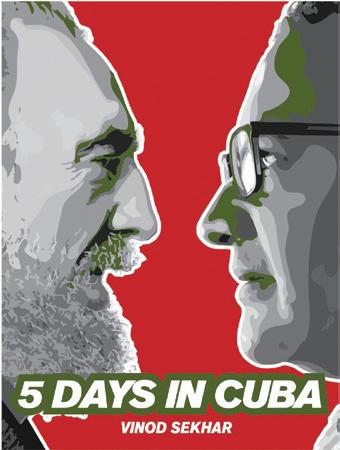
Middle East. We have to respect the cultural, religious, and essentially, the personality structures of the countries we go into.
The one thing we do not do is go in there, with the idea that we have the answers about how to do things here and we know. We are always looking for strategic partners; we are always willing to share because that is how we grow faster. If we try to do everything on our own, especially in countries where we have little experience, we will misunderstand the lay of the land, and trip up.
Our modular company in Australia operates differently to our main modular factory in Malaysia operates. It is different from how we operate in the UK, and it will be different in how we operate in India. In India, we are going to do a triventure in each state because each state is different. From the modular side, some states require more affordable housing, low cost housing because there is a need there. And in some states, you have big multinationals that require commercial workers accommodation and other structures.
Across the board, our main philosophy is to temper agreed, share the pot where necessary, where it is applicable, and do it fairly. Greed is neither good nor bad, greed just is. It is like having a powerful Bugatti that can do 0–60 in two seconds. If you do not know how to drive a car that fast, that powerful, you are going to drive straight into a tree or drive into someone else. But if you have control over that car, that engine, and you can take the straights at high speed, and you know how to accelerate and decelerate, then you have control over a very powerful engine, and anything is possible. And that is greed, it is just a powerful engine.
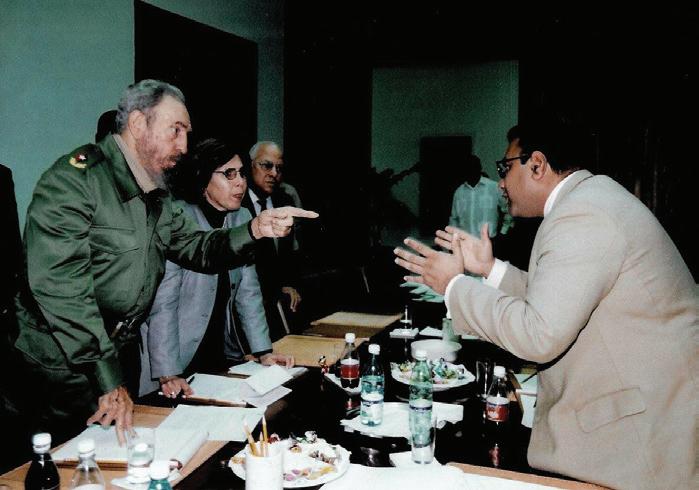
Our view of a fair balance is not always someone else’s view and is not always up for negotiation and something has to happen, and one side has to give a bit more sometimes. We are excited by our global growth and let us not forget, we are still a private group, none of our companies are listed and one day they will be.
We do not look at any singular initiatives because I look at things holistically, I do not believe we should do one-offs. Our foundation supports saving the tigers, nearly extinct in Malaysia. We support our rainforests and limit timber as best as possible, without taking away from communities that survive from the industry, it is a balance. We have several educational initiatives and during the pandemic we did a significant amount of things and spent a significant amount of money to ensure people had food. Everyone from foreign labourers to Malaysians living in villages who did not have access to foods, and we spent several million to ensure that. We do youth development, deal with polarisation among the races, religious understanding, education, and many other areas.
Our businesses are involved in recycling, sustainable housing, sustainable work practices, it is all part of the system. I do not really like the word CSR because it just allows people to just tick a box, and we have to do so much more. It must be in your lifeblood; it should be part of what your company does. I believe, the more we do to protect the environment, to protect the community and society, the better the company does; the stronger the company becomes; the more value a company has in the longer term. It is like playing chess, not checkers. Chess is about winning the whole board, the strategy for the whole board, and not just your immediate move. And I think that is what businesses must do. It is the bigger picture, the longer term. I find that these initials people use, it is too easy to tick a box. That is why I am an advocate for social capitalism, it is part of the lifeblood of how a company operates; it is how the employees operate; how the senior executives operate; it is how they choose their contractors; it is how they try and spread wealth, while making money as best as possible.
Innovation is often a key driver of success in today’s rapidly evolving business landscape. Can you discuss how Petra Group fosters a culture of innovation within the organization and encourages the development of ground-breaking solutions to meet market demands?
Well, innovation is everything. We want to call it innovation technology development, thinking outside the box. Innovation can mean, really, anything. And now with artificial intelligence and everything at play, there is so much opportunity. It has made things far more complex; it has made things far more competitive; but it has opened up the opportunities to do things differently, to do things better; to offer new solutions to problems. We have to use AI for the right reasons. To use artificial intelligence for education, for improving lives; using AI to cut jobs, to make yourself more money rather than anything else would be wrong. It cannot be the company’s sole purpose, but it cannot be wrong either, there needs to be a balance. It cannot be about cutting and using technology just to make more money: you lose your soul. A company is more than its business, it is more than its equipment, it is more than its tech; it is also about its people and the way the people operate inside. Our group is not perfect, we have our own problems like all other problems have, as problems and different economic environments affect us. But innovation is key to almost everything. And I always look for technologies and innovation, that is what I am about, that is what I love doing, it is what I miss. I almost want to go back to being a simple entrepreneur that just did stuff, invented stuff, built stuff — it is what I was good at. I kind of do less of that now because you know, we are a bit of a conglomerate, we have to operate differently. But we still look at investing in new technologies. We still look for new innovations. And I certainly, privately support new innovative ideas and new innovative technologies that I see coming up. The important thing is to be willing to take the risk because most innovations fail, that is just the bottom line. Some fail a few times before it succeeds. Green Rubber just did not commercially work for many years, until we got it to work. We changed the way it operated; we got the technology right — but we did not give up. And that is the key. That is innovation and if you are not willing to take the risk, you have no business going into it, and if people did not take that risk, we would have no innovation. We would have no evolution of technology. And how sad would that be?
So, we need business leaders to take a chance, to take risks, to invest in things that others might not. And I think that is what we do, at least we try to, as best as possible. And quite frankly, if you have the right innovation, the market demand will be there. It is how you offer that innovation, how you use that innovation, how you deliver that innovation.
Sometimes it is not just the tech, not just the idea, you have to then match it with the right marketing, with the right communication strategy, with the right branding strategy — that is the reality of the world. You have got to fix a problem; you cannot offer a solution to a problem that does not exist.
I think a lot of technologists and inventors miss that. Step one is having the brilliant ideas or the brilliant technology, but then the major and critical steps after is how do you package it; how do you deliver it; what problem is it solving; how do you convince the market to accept it; and how do you price it so that the market can have it. It’s not easy, and not everyone can do it.
One of the notable achievements of Petra Group is the establishment of the Green Rubber Global, which revolutionizes the recycling of end-of-life tires. Can you elaborate on the vision behind this initiative and how it contributes to the circular economy and sustainable manufacturing practices?
Let me tell you about how it started: my father who was one of the world’s top rubber scientists and one of his best friends, who was one of the top synthetic rubber scientists from Russia — so, the Malaysian, Russian leaders in the rubber industry, came together and said: we have got to find a solution for this problem of recycling rubber.
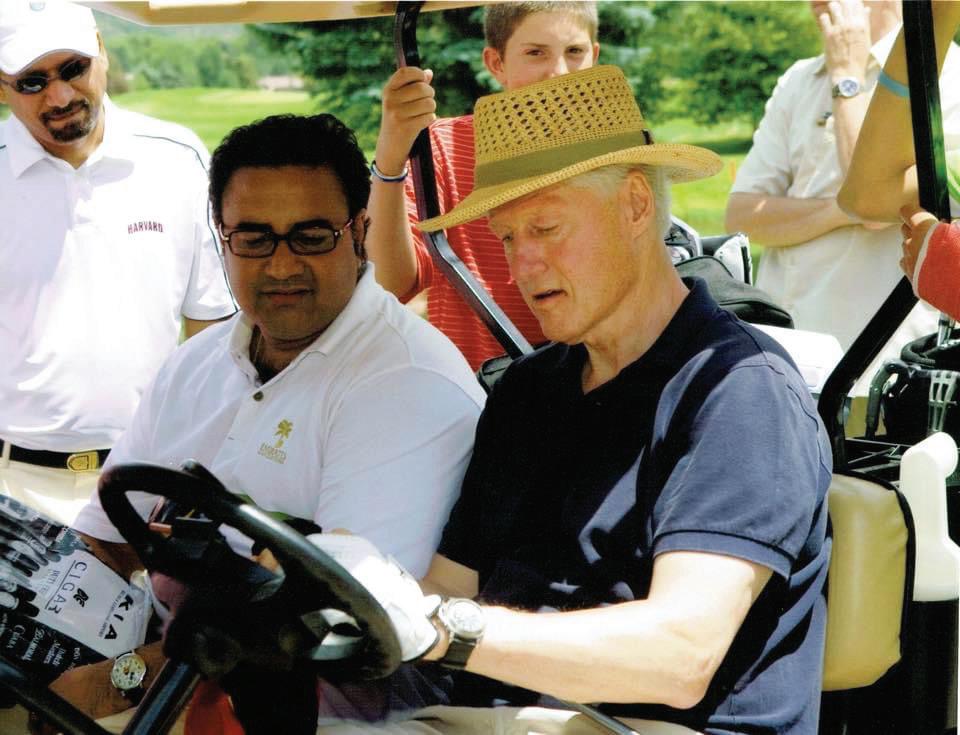
Charles Goodyear over 150 years ago created vulcanisation which is how rubber could become a product. They could not reverse it; the closest was a product called Reclaim, which took many hours, was a highly toxic process, involved a lot of energy usage, and you ended up with a product that had about 20% of the original properties of the compound.
So, you could use it for very cheap material, and that process has been banned in most countries because of its environmental impact, and its smell. But then some people evolved things along the way, but we were proud to be the first company to come up with a full recycling process. And it used something that my father created called DeLink — the process was a compound of chemicals, which you added to rubber dust, waste tires, scrap waste tires, and it turned into a rubber compound that could be used back into tires. And it held about 70–80% of the original properties. At that moment, it was the Asian financial crisis, and lot of economic issues. I believed in the company so much, that I ended up buying all the partners out and owning it. And I asked my father at the time, let us keep working on it, let us keep innovating because the technology will get there. We finally got the technology to a level that would allow us to recycle rubber effectively and commercially, and it was used in Timberland boots and Timberland shoes, quite a lot in those days. But it was still, then, a very labour intensive process. It would take a huge amount of space and a lot of equipment to make our Green Rubber compound, and so, the next step was, if we kept expanding with labour, we would lose quality control, and there would be lots of problems after that. So, we stopped and said: look, we need to evolve this further. By this stage, my father had passed away, so I was looking at this company and saying: how do we improve it, we have already gone from version one to version two, and we just had to keep improving it. And we did. We spent a lot of money, a lot of time, energy, effort, surviving the global financial crisis and other things along the way, and then came up with a fully automated production system. Which is now night and day for our technology. That factory is now about to be opened and now we can truly deal with the world’s number one environmental hazard — we were dealing with it before, but now we can actually expand and do it in quantums that were unheard of before, and that no one else could do, and can do.
This is why I say, you have to make it commercial, otherwise it will not have a global impact. If you just do an innovation or technology just to show your work, you will get a pat on the back, you will get an award, but have no global impact. It has to be commercial; it has to make money; it has to make sense for it to have global impact. And that is what will make the difference. Because when you have global impact, you change everything. The problem of tires has to be dealt with and luckily, since we evolved this, the world has also become greener and demanding more green. It has changed over the last decade alone and that is fantastic. We are very excited about where our leap with Green Rubber is, and we think it will make a huge difference. Right now, we produce green rubber at roughly half the price of the equivalent virgin compound — now, that is amazing, right? Imagine you are a manufacturer of a product, any product — tire, shoes, gas stoves, anything! — imagine, that you can now buy the equivalent rubber compound for half the price and use green rubber. And green rubber can be used in different variations, so you do not have to use 100% green rubber, it is because all rubber products are technically specified, you decide what your technical requirements are. Some cases, green rubber is too good, so you have to cheapen it.
In some cases, you have much higher requirements, so green rubber, in its current form, is not the right properties. But you just have to add more virgin compound, to increase the properties, maybe use 50% green rubber and 50% virgin compound. Whatever way you look at it, you are still saving the planet. You are still using recyclable material. At the same time, the more recyclable material you use, the more money you are saving, and the more money you are making. It is win-win across the board. And that is what is exciting for me with Green Rubber.
In recent years, we have seen an increased emphasis on digital transformation across industries. How has Petra Group leveraged technology and digital advancements to optimize its operations, enhance customer experiences, and drive growth in today’s digital era?
There has always been transformation of one kind or another: automation, digital, electric, all this sort of stuff has been going on forever. And we always have to evolve, we always have to move forward. What is happening now is just a faster evolution and I think that is what has been happening in the world. What used to take 100 years to change, is changed in 50 years. What used to take 50 years, takes 25. Now things are evolving every six months, and this is going to be the way things work. Digital transformation has helped our processing, and we used it in Green Rubber. We are definitely using it in our plantations for vanilla. We are using it in our modular systems, so it is part and parcel of what we have to do. These are tools, these are evolutions that are available, that allows us to make better products, make it faster, and to ensure quality and efficiency. As with everything, you have to balance it out, you have to make sure that depending on where you are, and the community, and the country you are in. It cannot be about replacing labour. It cannot be about making more money — there has to be a balance. And so, we use the digital revolution that is occurring now, to improve our services, the quality of our goods, to improve efficiency, and keep the balance.
Collaboration and partnerships often play a crucial role in business expansion. Could you share some examples of strategic partnerships or collaborations that Petra Group has engaged in and how they have contributed to the company’s growth and global impact?
Collaboration and strategic partnerships are critical. It is the only way we can grow globally and fast, effectively. And it takes on different forms, if you look at our modular business when it comes to India, we do not know the landscape here in terms of contractual work, operating here, and the approval system, and the construction requirements; so, we have to tie up with the right partner that can deal with that side of things, implement, and deal with the kind of things that we produce.
It is the same way with all our other businesses, even Green Rubber, depending on where we go. We have our own IPO with our monorail system, it is our IP that operates the

Malaysian monorail system for KL Monorail. We are now bidding for contracts in The Middle East and India, and other places. But again, we have to do that in conjunction with the right partners. Because we can do a certain amount of things but we cannot do it all. So, we have to find the right collaborative partners, with the right technology, the right skillset, that can deliver our products and/or the other essential components to the project. SO, like that, we find those kinds of partners and we move forward.
It is being willing to sharing the pot and profit, and to do it fairly. If you are too greedy, you can lose it all. If you share it fairly, and make sure everyone gets a piece, and ensure it is a positive result for everyone, we all make money. And the more you do that, the more people want to buy from you. That is what drives us in how we strategically move globally and how we implement our projects.

Looking ahead, what are the key strategic priorities and future plans for Petra Group? Are there any new ventures, industry trends, or market segments that the company is actively exploring or considering for expansion?
Right now, we are post-pandemic, we are restrengthening our foundational stones, and moving globally as quickly as we can with our different projects, our different businesses, and our partners. It is an exciting time, there is so much opportunity in the world. Lot of risk, but we are moving forward. I am trying my best not to invest in too many new things because we have enough on our plate.
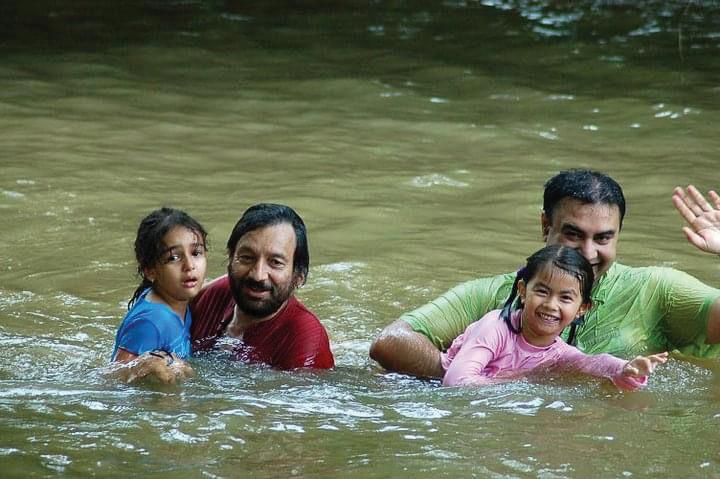

Our media company is excitedly growing in the States and now in India. It is exciting we can see that happening in platforms and the technology behind those platforms. And we will keep looking for new innovations that relate to our existing businesses. I doubt that we will look at any new technologies that are not related to what is in the group as it is, so that we can focus on what we have and grow it globally as quickly, and as effectively as we can.
One of the areas that I have invested historically in a few different companies is water and water technology because I think that is the future. It is going to be a critical part of what the world needs, and delivery of it, cleaning of it, and ensuring healthy drinking water in different parts of the world. There are lots of technologies out there; there are lots of people playing in that space, and I am one of them, and we will see where that goes. But it is an exciting time, it is a pivotal moment for humanity, you know, we will either blow ourselves up and destroy this earth or realise that we have both the technology and the ability to save this world and sav everyone that is in it. It is just the willingness to do so, and I hope we make the right decisions.
It takes a village, it takes the world now, it takes lot of us coming together and pushing. I will keep pushing and I have a lot of friends who are pushing, incredible individuals, who are doing remarkable things, trying to make a difference. I am a minor player compared to them, but I am inspired by what they do, so I will keep doing it as well. And I hope others follow, it is time for true leadership, it is time for people to stand up and be counted. And I would ask entrepreneurs and business leaders everywhere: stand up and be counted, represent who you are, what you believe in, and try [and] ensure it comes through in the businesses you have.
Again, I will repeat, no one is going to get it all right. We all make mistakes, and God knows I have, but you know, that is how we learn. And again, it is the willingness to keep going and keep trying to do the right thing. And I think that is where business leaders must move forwards to.

I think what is important, and it is not a secret anymore, I should share it, since it is already out. I of course, have a different perspective, in terms of what I want the Group to do and my foundation — it is my legacy. I am sitting here, waiting for a heart transplant. We have had two false starts at the last minute because of rejection, potential rejection, you know, I have to wait and see. Facing mortality gives you a far more focused look at things: what you are about, what your legacy should be. But more importantly, exactly what needs to happen, to ensure continuity, to ensure that your belief can keep growing; and I say this just because it affects me, it affects everyone; it does not matter whether you are having a problem, a medical problem like what I am having, because that continuity surely must be a very important part of a business.
Your belief system, what you believe you want to happen, you need to share that and make sure other people around you believe that as well and are willing to push it forward even if you are not around, even if you step away. And I think that is a critical element. It is certainly what I want my Group to be, going forward.










